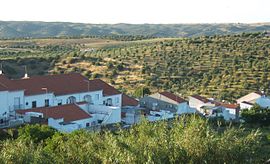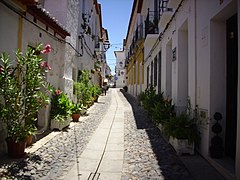Moura, Portugal
Moura | |
|---|---|
 | |
 | |
| Coordinates: 38°08′N 7°27′W / 38.133°N 7.450°W | |
| Country | |
| Region | Alentejo |
| Intermunic. comm. | Baixo Alentejo |
| District | Beja |
| Parishes | 8 |
| Government | |
| • President | Santiago Macias (CDU) |
| Area | |
• Total | 958.46 km2 (370.06 sq mi) |
| Population (2021) | |
• Total | 13,258 |
| • Density | 14/km2 (36/sq mi) |
| Time zone | UTC+00:00 (WET) |
| • Summer (DST) | UTC+01:00 (WEST) |
| Local holiday | Saint John June 24 |
| Website | www |
Moura (European Portuguese pronunciation: [ˈmoɾɐ] ⓘ) is a city and a municipality in the District of Beja in Portugal, subdivided into 5 freguesias. The population in 2021 was 13,258,[1] in an area of 958.46 square kilometres (370.06 sq mi).[2] The city itself had a population of 8,459 in 2001.[3] It has now around 11,000 inhabitants.
The current mayor is José Pós de Mina, elected by the Unitary Democratic Coalition. The municipal holiday is 24 June.
It is home to Moura Photovoltaic Power Station, one of Europe's largest solar-power facilities and the Castle of Moura.
There are two wine regions within the borders of Moura municipality: Moura centered around the town of Moura and Granja-Amareleja within the parishes of Amareleja, Póvoa de São Miguel and part of Santo Amador and São João Baptista.[4][5]
Parishes
[edit]Administratively, the municipality is divided into 5 civil parishes (freguesias):[6]
- Amareleja
- Moura (Santo Agostinho e São João Baptista) e Santo Amador
- Póvoa de São Miguel
- Safara e Santo Aleixo da Restauração
- Sobral da Adiça
Climate
[edit]Moura has a Mediterranean climate with very hot, dry summers and mild winters. It is one of the driest areas in Portugal with just over 400 mm (16 in) of precipitation.
| Climate data for Moura, 15 year period (between 1941 and 1991), 158 m (518 ft) | |||||||||||||
|---|---|---|---|---|---|---|---|---|---|---|---|---|---|
| Month | Jan | Feb | Mar | Apr | May | Jun | Jul | Aug | Sep | Oct | Nov | Dec | Year |
| Mean daily maximum °C (°F) | 14.3 (57.7) | 15.9 (60.6) | 18.7 (65.7) | 21.1 (70.0) | 24.9 (76.8) | 30.2 (86.4) | 34.2 (93.6) | 34.1 (93.4) | 30.2 (86.4) | 24.3 (75.7) | 18.5 (65.3) | 14.5 (58.1) | 23.4 (74.1) |
| Daily mean °C (°F) | 9.9 (49.8) | 11.1 (52.0) | 13.3 (55.9) | 15.3 (59.5) | 18.4 (65.1) | 22.8 (73.0) | 25.8 (78.4) | 25.6 (78.1) | 23.2 (73.8) | 18.6 (65.5) | 13.8 (56.8) | 10.4 (50.7) | 17.3 (63.2) |
| Mean daily minimum °C (°F) | 5.4 (41.7) | 6.3 (43.3) | 7.8 (46.0) | 9.4 (48.9) | 11.9 (53.4) | 15.3 (59.5) | 17.3 (63.1) | 17.1 (62.8) | 16.1 (61.0) | 12.9 (55.2) | 9.1 (48.4) | 6.2 (43.2) | 11.2 (52.2) |
| Average precipitation mm (inches) | 56.8 (2.24) | 45.4 (1.79) | 49.2 (1.94) | 40.7 (1.60) | 30.8 (1.21) | 15.4 (0.61) | 2.8 (0.11) | 2.1 (0.08) | 17.9 (0.70) | 46.2 (1.82) | 50.9 (2.00) | 60.7 (2.39) | 418.9 (16.49) |
| Source: IPMA[7] | |||||||||||||
| Climate data for Contenda, 1971-2000 normals and extremes, altitude: 450 m (1,480 ft) | |||||||||||||
|---|---|---|---|---|---|---|---|---|---|---|---|---|---|
| Month | Jan | Feb | Mar | Apr | May | Jun | Jul | Aug | Sep | Oct | Nov | Dec | Year |
| Record high °C (°F) | 25.5 (77.9) | 28.5 (83.3) | 29.5 (85.1) | 30.5 (86.9) | 34.2 (93.6) | 42.5 (108.5) | 44.1 (111.4) | 42.1 (107.8) | 40.7 (105.3) | 34.6 (94.3) | 27.2 (81.0) | 25.9 (78.6) | 44.1 (111.4) |
| Mean daily maximum °C (°F) | 12.9 (55.2) | 14.3 (57.7) | 17.4 (63.3) | 18.6 (65.5) | 22.3 (72.1) | 28.0 (82.4) | 32.5 (90.5) | 32.4 (90.3) | 28.6 (83.5) | 22.1 (71.8) | 17.0 (62.6) | 13.8 (56.8) | 21.7 (71.0) |
| Daily mean °C (°F) | 9.4 (48.9) | 10.4 (50.7) | 12.6 (54.7) | 13.7 (56.7) | 16.6 (61.9) | 21.2 (70.2) | 24.8 (76.6) | 24.7 (76.5) | 22.3 (72.1) | 17.5 (63.5) | 13.4 (56.1) | 10.5 (50.9) | 16.4 (61.6) |
| Mean daily minimum °C (°F) | 6.0 (42.8) | 6.6 (43.9) | 7.9 (46.2) | 8.7 (47.7) | 10.9 (51.6) | 14.3 (57.7) | 17.1 (62.8) | 17.1 (62.8) | 15.9 (60.6) | 12.9 (55.2) | 9.6 (49.3) | 7.3 (45.1) | 11.2 (52.1) |
| Record low °C (°F) | −5.0 (23.0) | −2.6 (27.3) | −3.0 (26.6) | 0.8 (33.4) | 2.5 (36.5) | 6.3 (43.3) | 8.9 (48.0) | 9.0 (48.2) | 6.4 (43.5) | 3.4 (38.1) | 0.2 (32.4) | −3.0 (26.6) | −5.0 (23.0) |
| Average rainfall mm (inches) | 75.5 (2.97) | 61.6 (2.43) | 45.5 (1.79) | 73.8 (2.91) | 45.2 (1.78) | 26.1 (1.03) | 6.3 (0.25) | 4.2 (0.17) | 34.0 (1.34) | 70.2 (2.76) | 72.6 (2.86) | 99.1 (3.90) | 614.1 (24.19) |
| Average precipitation days (≥ 0.1 mm) | 10.1 | 10.8 | 9.5 | 10.5 | 8.2 | 4.6 | 1.2 | 0.9 | 3.8 | 9.7 | 8.5 | 11.3 | 89.1 |
| Source: Instituto Português do Mar e da Atmosfera[8] | |||||||||||||
Town Twinning
[edit]Moura has cooperation agreements with the following cities:[9]
 Aroche, Spain, since 1994
Aroche, Spain, since 1994 Bissau, Guinea-Bissau, since 1997
Bissau, Guinea-Bissau, since 1997 Amareleja-Valencia del Mombuey, Spain, since 2000
Amareleja-Valencia del Mombuey, Spain, since 2000 Medjez El Bab, Tunisia, since 1995
Medjez El Bab, Tunisia, since 1995 Roccagorga, Italy
Roccagorga, Italy
Other towns with the same name include:
 Moura, Australia
Moura, Australia
Notable people
[edit]- Gonçalo Abecasis (born 1976) a Portuguese American biomedical researcher at the University of Michigan
- Corino Andrade (1906–2005) a leading neurologist and researcher who first described the familial amyloidotic polyneuropathy (FAP) syndrome
- Miguel Garcia (born 1983) a former footballer with 228 club caps
- Eunice Muñoz (born 1928 in Amareleja) a Portuguese actress
- Francisco Martins Rodrigues (1927– 2008) a Portuguese anti-Fascist and the founder of the Portuguese Marxist-Leninist Committee
- António Rolim de Moura Tavares (1709 – 1782) the 1st Count of Azambuja and the 10th Viceroy of Brazil
Gallery
[edit]- Moura, Portugal
- Moura, Portugal
- Moura, Portugal
- Moura, Portugal
- Moura, Portugal
See also
[edit]References
[edit]- ^ INE (2021). "Censos". Instituto Nacional de Estatística. Retrieved 2025-01-27.
- ^ "Áreas das freguesias, concelhos, distritos e país". Archived from the original on 2018-11-05. Retrieved 2018-11-05.
- ^ UMA POPULAÇÃO QUE SE URBANIZA, Uma avaliação recente - Cidades, 2004 Nuno Pires Soares, Instituto Geográfico Português (Geographic Institute of Portugal)
- ^ "DOP Alentejo - Moura". IVV. Retrieved 2025-01-27.
- ^ "DOP Alentejo - Granja-Amareleja". IVV. Retrieved 2025-01-27.
- ^ Diário da República. "Law nr. 11-A/2013, page 552 79" (pdf) (in Portuguese). Retrieved 28 July 2014.
- ^ "Plano de Gestão das Bacias hidrográficas integradas na Região Hidrográfica 7" (PDF). APA. p. 114. Retrieved 25 June 2021.
- ^ "Monthly Averages for Contenda (1971–2000)" (PDF). IPMA.
- ^ "Twinning Cities and Towns: Moura" (in Portuguese). Lisbon, Portugal: Associação Nacional de Municípios Portugueses [National Association of Portuguese Municipalities]. Retrieved 12 July 2020.
External links
[edit]


 French
French Deutsch
Deutsch





